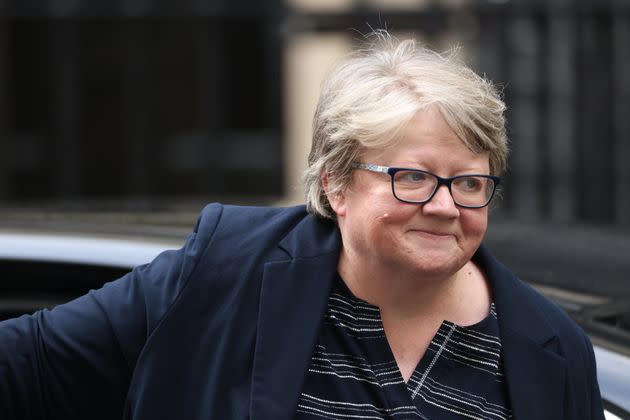After Therese Coffey was appointed health secretary, she immediately began dissing the Oxford comma. The comma is a punctuation mark that appears before the last item in a list. Its ban was announced on the Department of Health and Social Care’s intranet.
Therese Coffey’s dislike of the Oxford comma
The Oxford coma is the punctuation mark that appears after the penultimate term in a series. Its use has been a matter of much controversy across the English-speaking world. While American English generally does not require the Oxford coma, British English does. While some style guides still mandate the Oxford coma, others have advised against using it.
The new health secretary, Therese Coffey, has publicly stated her dislike of the Oxford coma. It was reported that she had written guidance for her staff asking them to avoid using it. The guidance was published on the Department of Health and Social Care intranet.
The Health Secretary Therese Coffey’s office has come under fire for its guidelines. The email instructed staff not to use the Oxford comma in list of three or more items. It also banned phrases and words such as very, unacceptable, right, meet, and disappoint. The email sparked a backlash among health workers who regarded it as patronising.
Coffey and Truss met as young Tories during the 1990s and ’90s and became friends as campaigning together. The two went on to get PhDs from Oxford before becoming MPs. She also worked in finance at Mars Drinks UK and at the BBC. In the last decade, there was a huge rise in her career. In addition to the health minister position, she was appointed as the Secretary of State for Work and Pensions in January 2019. Since her appointment as the DWP, she has won praise for her quiet and unpretentious manner.
- Also Read: Biotulin Avis Is This site Legitimate?
- Also Read: Zep Stove and Oven Cleaner Authentic Reviews!
Her guidance to healthcare workers
Therese Coffey’s appointment as deputy prime minister has raised concerns from pro-abortion activists. She has argued that the law regarding abortion will not change during her time in government. However, she has already done much to complicate access to abortions during her time as an MP. Ultimately, she will not be able to deliver on her promise of decriminalising abortion.
The guidance was circulated to health security agency staff and told them to stop using the Oxford comma in their writing. It also instructed them to stop using “jargon” and to be “positive” in their language. The guidance has caused a backlash and many health workers have criticised it as being patronising.
The guidance to healthcare workers sent by Therese Coffey’s office has caused widespread criticism from staff and patients. Although Government sources say it is normal for ministerial teams to create a broad style guide, NHS staff say it is demoralising. However, the email may be helpful in teaching staff how to use proper grammar.
Therese Coffey’s appointment to cabinet role as deputy prime minister follows her time as secretary of state for work and pensions. Previously, she held the position of Minister of State at the Department for Environment, Food and Rural Affairs. Her academic background includes a PhD in chemistry, and she is a qualified chartered accountant.
However, Dr Coffey’s vote against at-home abortion pills in England during the recent pandemic of abortion has caused controversy. Although the government has promised to allow abortions in England, abortion charities have accused Dr Coffey of placing her personal beliefs ahead of expert clinical guidance.
Her ties to Liz Truss
The appointment of Therese Coffey as Liz Truss’s deputy raises questions about her ties to the Prime Minister. Although she’s been a friend of Truss’s for years, Coffey’s political views are on the left. She’s a strong opponent of gay marriage in England and voted Remain in the recent Brexit referendum. On the campaign trail, she said she was labeled a “traitor” by some.
Therese Coffey’s alleged ties to Liz Truss have led to speculation that she’ll be offered a senior Cabinet position by the new prime minister. Coffey has long been a friend of Liz Truss, and supported her leadership campaign during the Conservative leadership election in 2010. The two women are also members of the same party, and co-operate closely on policy and social issues.
Coffey is also a Catholic. Her Catholic beliefs and her Catholic faith have drawn ire among pro-life activists. However, Coffey is now the health secretary, which is a major role. Although Coffey has a history of being a pro-life candidate, her appointment has created controversy.
As Secretary of State for Work and Pensions, Coffey has been a critic of abortion. She voted against the introduction of same-sex marriage legislation and was one of only 72 MPs who opposed extending that right to Northern Ireland. She has also expressed her disapproval of abortion, saying that it’s better to not have it than to have it.
- Also Read: Cannabis Smokers Country Which Country Is Better For Cannabis Smokers?
- Also Read: Bar Bambi Authentic Reviews!
As prime minister, Liz Truss aims to make Brexit happen. After all, the prime minister is the head of the government. As such, it’s essential for her to prove herself as an effective leader. If Liz Truss is a successful PM, Labour could find itself in a difficult position.
Coffey served in Truss’ cabinet for three years. She also endorsed Truss in the leadership race.
Her style guide for civil servants
Therese Coffey is a former work and pensions secretary and a close friend of Liz Truss. The pair campaigned together for the Conservative Party and Miss Coffey went on to work for BBC and Mars Drinks UK. After a career in finance, Coffey was appointed to the Department for Work and Pensions. This role is considered a poison chalice and colleagues have compared her to a yin and yang.
Therese Coffey’s office has issued style guidance for civil servants, telling them to avoid the Oxford comma and technical jargon. The guidance also bans the use of the Oxford comma. Some civil servants have criticised the policy as patronising and others defended it as a useful guide for staff.
The guide has also been sent to Jacob Rees-Mogg, the Leader of the House of Commons in Boris Johnson’s government. It tells staff not to use the Oxford comma, which is used to separate two items in a list of three or more. Other forbidden words and phrases include “very”, “because of,” and “fate.”
Therese Coffey’s style advice is based on her personal opinion of the correct way to write letters and emails. She also provides tips for civil servants to avoid making embarrassing mistakes. Besides being an MP, Therese Coffey is a senior civil servant who has been criticized for her views on the NHS.
In the past few years, she has argued for NHS reform and has voted against smoking bans. She has also voted against making abortion services available to private patients. She is currently the Health Secretary of England and Wales. She has a long-standing ally with Liz Truss. The Conservative Party has made her a cabinet member with a history of opposing gay marriage and abortion rights.














